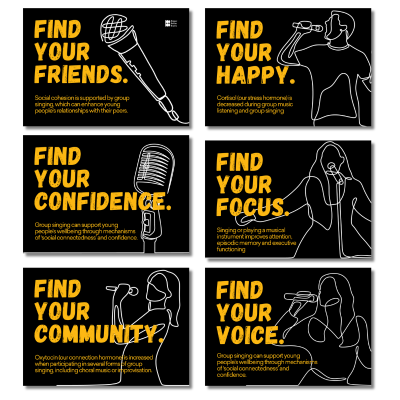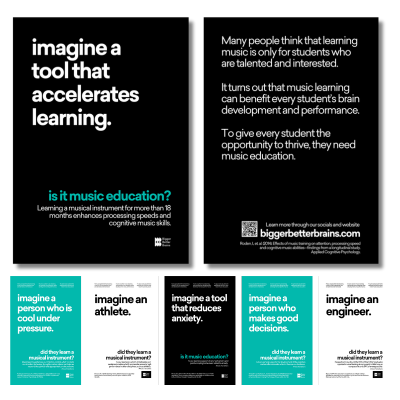
Research Updates

Here at Bigger Better Brains we believe that through educating yourself, you can then educate and affect positive change in your community.
With all of the research in the field of neuromusical science, our BBB Research section serves as a content hub for you. We regularly share findings and break down the latest research to educate and inspire discussion. We hope you enjoy this page on our website and share BBB news with your colleagues, parents and students.
BBB Easter Campaign
Free Easter campaign download with posters and social tiles to help students understand the value of music learning.
The No-Extra-Work Secret to Music Advocacy
What if you could advocate for music education without adding more work to your already packed schedule?
How Music Learning Keeps Your Brain Sharp for Life
Engaging in musical activities offers profound benefits for our brains, enhancing various cognitive functions and emotional well-being.
Inspiring the Next Generation: Celebrating Ruby Mensforth, BBB Music Teacher Award Runner-Up 2025
While there can only be one winner of the BBB Music Teacher Award, we also recognize the outstanding efforts of our 2025 Runner-Up, Ruby Mensforth—a teacher whose dedication to fostering a love of music has left a lasting impact on her students.
How Playing Instruments and Singing May Boost Your Brain
Playing an instrument or singing in a choir isn’t just fun—it’s great for brain health too. A recent study found that people with musical experience have stronger memory and thinking skills than those without.
See, Know, Advocate: FREE Poster Digital Download
For many music teachers, March means concert season, assessment planning, and advocating for the importance of music education as budgets and schedules for next year take shape.
We know that speaking up for music in schools can feel overwhelming—but you don’t have to do it alone.
Unlocking Team Flow: The Hidden Power of Making Music Together
If you've ever conducted or played in an ensemble, you’ve likely felt it—that moment when everything clicks, the music soars, and your group performs at a level beyond anything you thought possible.
The Future of Work: Why Music Learning Prepares Students for Tomorrow’s Jobs
The World Economic Forum's Future of Jobs Report 2025 highlights the critical skills that will define the workforce of tomorrow.
Aging Ears: How Hearing Loss Impacts Music Perception
A recent study in Ear and Hearing investigated how aging and hearing loss influence music perception, focusing on melody and timbre discrimination.
Prenatal Rhythm: How Fetal Brains Tune into Music
A new study in the Journal of Neuroscience reveals that our brains start processing rhythm as early as 27 weeks into pregnancy.
2025 Celebrate To Advocate Calendar
The 2025 Celebrate to Advocate Calendar is your go-to guide for making advocacy effortless this year!
How Music Unites Us: The Heartbeat Connection
A recent study from Waseda University has uncovered that when individuals listen to music, their heart rates synchronize, reflecting a unified physiological response.





















